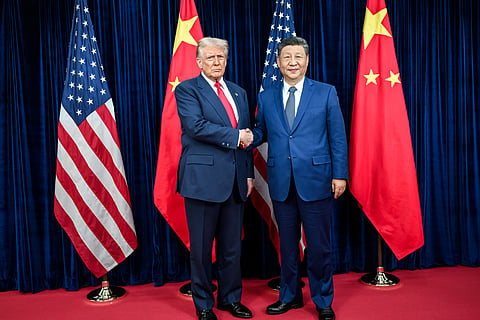

A day after U.S. President Donald Trump’s summit meeting with Chinese President Xi Jinping, consensus is emerging across Western media that Xi walked away as the clear victor. The tangible outcomes of the meeting, held on the sidelines of the APEC summit in Busan, South Korea, reflect a shifting balance of power—one increasingly tilting toward Beijing.
During the 100-minute meeting on Thursday, Xi reportedly secured several major concessions from Trump. The United States agreed to reduce overall tariffs on Chinese goods from 57% to 47%, and to halve the so-called “fentanyl tariff” from 20% to 10%. Trump also consented to lift, for one year, export controls restricting Chinese access to U.S. technology and to suspend recently imposed port fees on Chinese vessels, which had reached as high as $1.5 million per ship.
In return, China agreed to resume purchases of American soybeans and to temporarily lift export restrictions on rare earth minerals. Notably, critical topics such as Taiwan and China’s purchases of Russian energy were not discussed—a development that many Western analysts interpreted as evidence of Washington’s retreat and Beijing’s leverage.
The Guardian characterized the meeting as a humiliation for Trump, running the headline: “Xi-Trump Meeting: America Has Discovered That Bullies Can Be Bullied Back.” The article argued that Trump, long accustomed to coercing smaller states into concessions, underestimated the strength of China’s response to U.S. trade aggression and was now “paying the price.”
Observers have described the deal as a temporary truce rather than a breakthrough. China conceded little while retaining most of its advantages established since the trade war began in April. The fragile detente could unravel if Washington—or Trump personally—chooses to reimpose tariffs or escalate tensions.
Adding to the context, on October 15, the RAND Corporation, a major U.S. policy think tank, released a report advising Washington to “back off” from direct confrontation with Beijing. Some analysts suggest the paper may have influenced Trump’s softened tone and that the current pause in economic hostilities represents not a policy reversal, but a recalibration as the U.S. reassesses its broader China strategy.